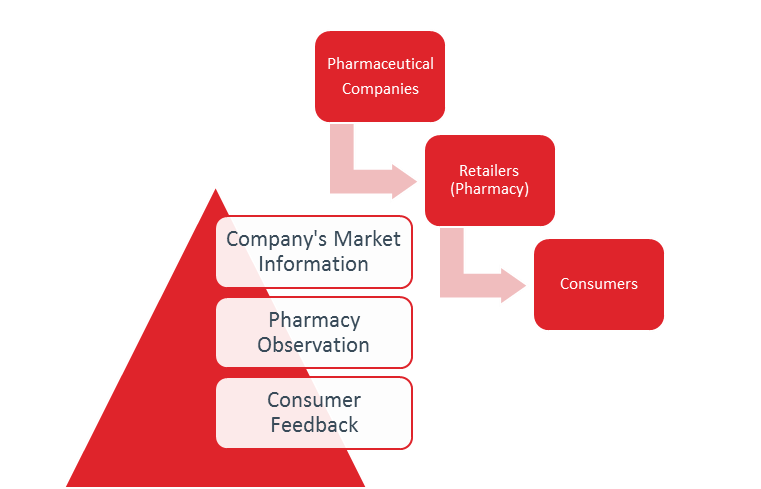Top Do’s & Don’ts of Field Agent Management: Get the Best Out of Your Medical Representatives
Pharmaceutical industry has a traditional distribution network where trade channel management is the primary sales pipeline along with being the distribution funnel for the industry. Channel management is of primary importance in this sector, unlike other growing industries. Pharmaceutical companies design their product mix based on extensive market and clinical research and development evaluation. However, the primary buyers for the industry are retailers.
- Companies design products for consumers
- Retailers buy from companies using market knowledge to decide required volume
- Consumer use pharmaceutical products from retailers (pharmacies)
In 2015, pharmacy and drug store retail sales revenue passed $263 billion. Pharmacy and drug stores dispense prescription and over-the-counter medicines. With increased investment in research and development (R&D) by pharmaceutical companies, they now have an extensive product mix of essential and commercial medicines (drugs).
Over-the-counter drugs crossed $31 billion sold units in US pharmacy and drug store sales.
This brings in to limelight the distribution network that these pharmaceutical giants utilize which sustains dissemination of this fast-paced merchandise to the market.
Field Agent Management in Pharmaceutical Distribution
With consumer feedback and stock replenishment being the priority for pharmaceutical companies, the focus invariably comes over field agent management. Let’s look at the benefits of effective field agent management.
- Higher Stock Replenishment Rate
- Better Retailer/Wholesaler/Pharmacy Relations
- Higher Accountability for Stock Handovers
- Higher Field Agent Utilization
- Lesser Service Disruptions
- Lesser Invoicing Errors
- Higher Repeat Sales
- Lesser Resource Cost
To realize these benefits, companies must streamline and optimize their field agent management, maximizing their potential. These optimization un-lockers can be charted through some very important Do’s and Don’ts.
Do’s and Don’ts of Field Agent Management:
Don’ts:
- Avoid manual and hap-hazard schedule planning for medical representatives. Each retail or pharmacy visit can be timed perfectly to reap the best benefits.
- Avoid a misbalance of priorities where total visits increase without service quality. This can happen when a singular parameter is highlighted rather than the overall structure.
- Never ignore retailer feedback. Many a time, retailer or channel feedback is not captured or ignored due to lack of feedback recording mechanism.
- Never stop analyzing data. Field agent management is inept if you don’t back it with comprehensive data analytics.
- Avoid channel distribution disruptions due to traffic or climate hassles by planning in advance for obvious eventualities.
- Avoid invoicing errors as they put the brand at risk of dilution. Rather streamline the order input process to make it transparent.
- Avoid a rigid information capturing system for your field agents. Rather use a simple app interface for your medical representatives to use on the go.
Do’s:
- Always allocate the visit to the field agent who is most likely to connect with the retailer or pharmacist. Historical analytics can get a better grasp of such minute details.
- Always be aware of the market reality via the channel partners in direct contact with the actual users. Retailers and pharmacists can shine light on possible product or brand misplacements and suggest corrective action.
- Always optimize the routes of your medical representatives to maximize the overall reach and productivity of sales visits.
- Always keep the supply chain channel responsive in terms of possible product-recall by using real-time tracking and optimization within your distribution management system.
- Always use comprehensive territory mapping and analysis to capture sales trends within the channel distribution network.
- Always leverage the potential of field agent management to align the potential changes channel relations with the historically accrued analytics within the central repository of market information.
- Always invest in research and development, not just for product improvements, but also for technology evolution to get ahead in a majorly traditional industry.
Field agent management software for medical representatives always on the move should ideally be cloud-based.
Ease-of-system access is paramount as every moment spent on understanding a rigid system is a loss of the greatest resource available to any company, time.
A pharmaceutical company should look to decrease the learning curve around technology upgrades by opting for SaaS based solutions which integrate seamlessly with their field agent management priorities.
Cover Credit: BSIP SA / ALAM
270 2







I have checked your page and i’ve found some duplicate content, that’s
why you don’t rank high in google, but there is a tool that can help you to create 100% unique content, search for; Boorfe’s
tips unlimited content
Pingback: Sonya_t | Pearltrees